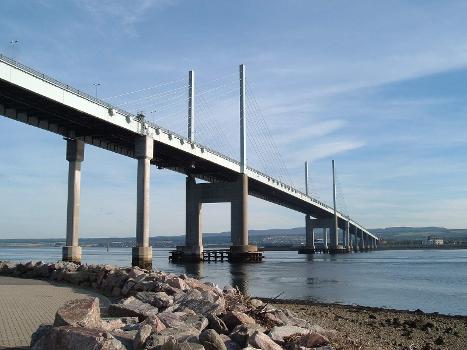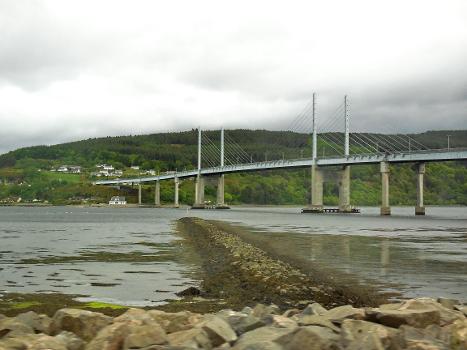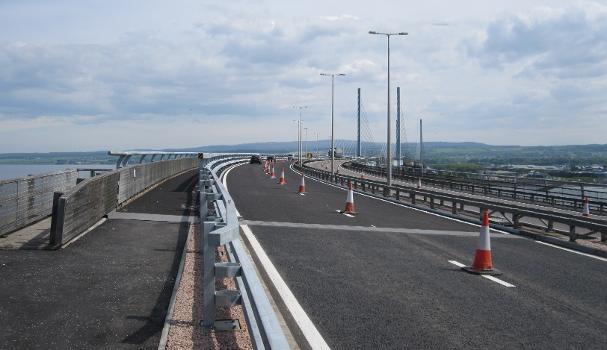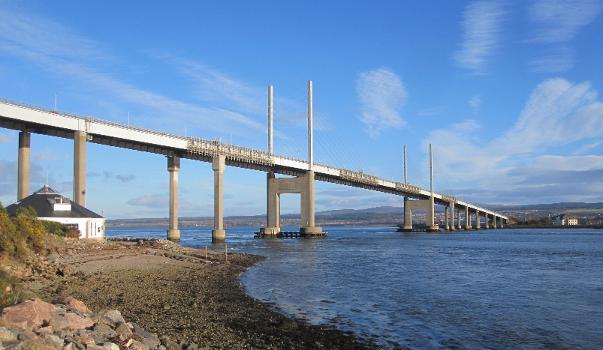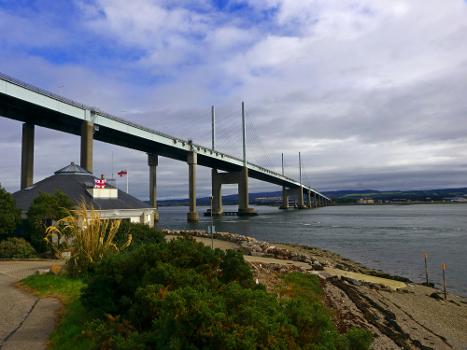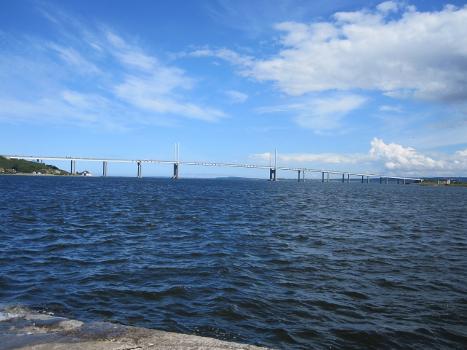General Information
Project Type
| Structure: |
Cable-stayed bridge with harp system |
|---|---|
| Function / usage: |
Road bridge |
| Material: |
Steel bridge Structurae Plus/Pro - Subscribe Now! |
| Secondary structure(s): |
Structurae Plus/Pro - Subscribe Now! |
| Material: |
Structurae Plus/Pro - Subscribe Now! |
| Secondary structure(s): |
Structurae Plus/Pro - Subscribe Now! |
Location
| Location: |
Inverness, Highland, Scotland, United Kingdom |
|---|---|
| Crosses: |
|
| Coordinates: | 57° 29' 56.07" N 4° 13' 43.27" W |
Technical Information
Dimensions
| main span | 240 m | |
| width | 22.00 m | |
| total length | 1 056 m | |
| span lengths | 3 x 64.00 m - 72.00 m - 80.00 m - 240.00 m - 80.00 m - 72.00 m - 5 x 64.00 m | |
| number of cables | 64 | |
| number of spans | 9 | |
| girder depth | 3.25 m | |
| pylon | pylon height | 45.00 m |
Materials
| piers |
reinforced concrete
|
|---|---|
| pylons |
steel
|
Excerpt from Wikipedia
The Kessock Bridge (Scottish Gaelic:Drochaid Cheasaig) carries the A9 trunk road across the Beauly Firth at Inverness, Scotland.
Description
The Kessock Bridge is a cable-stayed bridge across the Beauly Firth, an inlet of the Moray Firth, between the village of North Kessock and the city of Inverness in the Scottish Highlands.
The bridge has a total length of 1,056 metres (3,465 ft) with a main span of 240 metres (787 ft). Designed by German engineer Hellmut Homberg and built by Cleveland Bridge, it is similar to a bridge across the Rhine in Düsseldorf. The Beauly Firth is a navigable waterway and hence the bridge is raised high over sea level. The four bridge towers dominate the Inverness skyline, especially at night when they are lit.
The bridge carries the A9 trunk road north from Inverness to the Black Isle. It is the southernmost of the "Three Firths" crossings (Beauly, Cromarty and Dornoch) which has transformed road transport in the Highlands. It has proved a key factor in the growth of the city of Inverness.
To protect against any potential seismic activity of the Great Glen Fault, the bridge includes seismic buffers in its construction. These buffers are at the north abutment, nearly over the line of the fault, and they supplement longitudinal restraint at Pier 7, the south main pier. Each buffer is just over 3 metres (9.84 ft) long and weighs about 2.5 tonnes (2.46 long tons; 2.76 short tons).
History
Prior to 1982, travellers north of Inverness had the choice of the Kessock Ferry or a journey via Beauly. Cleveland Bridge were awarded the £17.5 million contract in 1975. Construction on the bridge began in 1976, with completion and opening in 1982. It won the combined design and construction Saltire Award.
Since 2007, the 25th anniversary of it opening, the Kessock Bridge has featured on the obverse of the £100 note issued by the Bank of Scotland. The series of notes commemorates Scottish engineering achievements with illustrations of bridges in Scotland such as the Glenfinnan Viaduct and the Forth Bridge.
The bridge was resurfaced from February to June 2013. The 20-week programme on the bridge's southbound carriageway will see Stirling Lloyd fulfil all preparation, waterproofing and resurfacing work using the Eliminator bridge deck waterproofing system combined with Gussasphalt, supplied by Stirling Lloyd's partners Aeschlimann AG. The project was managed by Stirling Lloyd's Darren Holmes, the improvement programme, being carried out on behalf of Transport Scotland, will, once completed, give the bridge deck surfacing a predicted life expectancy of over 30 years.
Text imported from Wikipedia article "Kessock Bridge" and modified on July 22, 2019 according to the CC-BY-SA 4.0 International license.
Participants
Relevant Web Sites
Relevant Publications
- : Highland Bridges. Aberdeen University Press, Aberdeen (United Kingdom).
- (1984): The Kessock Bridge Design-and-Build Contract, and Proposals for Managing Similar Contracts. In: Proceedings of the Institution of Civil Engineers, v. 76, n. 1 (February 1984), pp. 23-34.
- (1981): Kessock Bridge, Inverness (Scotland). In: IABSE Structures, v. 5 ( 1981).
- (1984): Kessock Bridge: Construction. In: Proceedings of the Institution of Civil Engineers, v. 76, n. 1 (February 1984), pp. 51-66.
- (1984): Kessock Bridge: Design by Contractor. In: Proceedings of the Institution of Civil Engineers, v. 76, n. 1 (February 1984), pp. 35-50.
- About this
data sheet - Structure-ID
20002538 - Published on:
31/12/2001 - Last updated on:
10/04/2022

